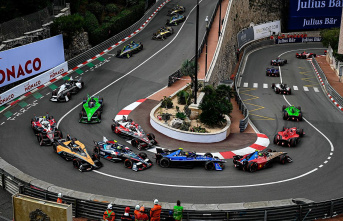Almost two and a half years after the collapse of the Wirecard Group, the criminal trial against former CEO Markus Braun, who was accused of billions in fraud, begins on Thursday. The indictment accuses the Austrian manager and two other accused former Wirecard executives of cheating banks and lenders out of a total of 3.1 billion euros with the help of falsified balance sheets.
Braun rejects the accusation in a recent statement through his lawyers - and indirectly accuses the investigators of lack of care.
100 process days scheduled
The taking of evidence will be extensive and difficult: The fourth criminal division of the Munich I Regional Court has scheduled 100 trial days up to the year 2024. The negotiations take place in a bunker-like underground meeting room next to the Munich-Stadelheim prison.
Both Braun and his likely opponent are in custody in Bavaria's largest prison: the former head of the Wirecard subsidiary Cardsystems Middle East in Dubai is the prosecutor's key witness.
According to his defense attorney, Braun's former subordinate intends "to continue his cooperative behavior as a key witness in the main hearing." As announced in the Bundestag committee of inquiry, he will face up to his responsibility. The third accused is a former chief accountant of the group.
At the beginning, the public prosecutor's office - three investigators in turn - wants to present the 89-page indictment. This is just the short version, but this alone will take an estimated five hours.
The main allegation: Braun and accomplices are said to have formed a gang that has been systematically falsifying the group's balance sheets since 2015. The payment service provider, which has since been settled, settled electronic payments at the interface between credit card companies on the one hand and retailers and other sellers on the other and collected fees for them.
losses instead of gains
According to the indictment, the group actually wrote losses. In order to conceal this, the Wirecard gang is said to have invented a non-existent "third-party business" for the Dubai subsidiary worth billions, including sham profits.
Wirecard reported rapidly increasing sales year after year, and in 2018 the IT company rose to the Dax. The group was now worth over 20 billion euros on the Frankfurt Stock Exchange. Braun was the largest shareholder with a share of seven percent and thus became a billionaire.
The collapse came in June 2020 and also largely destroyed Braun's fortune. After the British "Financial Times" had reported inconsistencies in the balance sheets for years, the company admitted that 1.9 billion euros could not be found, and bankruptcy followed. The proceeds of the third party business were reportedly held in escrow accounts in Southeast Asia. The money is still missing today.
Braun takes a different view, arguing that the funds held in the escrow accounts existed but were misappropriated. He accuses his co-accused, the former manager in Dubai.
"The fact that Wirecard's third-party partner business was not fictitious, but actually existed, is proven by the payment flows documented on account statements," says the statement, which Braun worked out together with his defense attorney Alfred Dierlamm. It names four third-party partner companies whose domestic accounts contain one billion euros.
Payments in connection with the third-party business are also said to have been processed via other companies. According to the statement, the accounts of these companies available to date also contain around one billion euros in deposits in connection with Wirecard's third-party partner business.
Defendant against Defendant
Braun raises serious allegations against the accused ex-boss of the Dubai subsidiary: The transaction data from Wirecard's third-party partner business with a volume of several billion transactions per year were processed in an external database. However, according to the findings of the compliance department of Wirecard AG, this data was deleted by the manager "in direct temporal connection with the collapse" of the company.
"This means that the data basis for the entire process has been withdrawn," the statement said. Braun and Defense write of "reliable indications" that a very significant part of the payments were commission payments to which Wirecard AG was entitled - "which, however, were not transferred to Wirecard AG's trust account, but were embezzled."
Payment flows to companies in Hong Kong, Antigua, Singapore, British Virgin Islands and other shadow companies are documented. "The payment flows to these embezzlement companies have not been traced to date," the statement said; it contains the accusation that the public prosecutor's office did not investigate precisely enough. "Dr. Markus Braun was not involved in the machinations, which only served to misappropriate funds from Wirecard AG, and had no knowledge of them."
Thus, the presiding judge Markus Födisch and the chamber must clarify whether Braun was a fraudster or a fraudster. The public prosecutor's office contradicts allegations of lack of care. The complete indictment is 474 pages long, the files fill 700 volumes.
The Wirecard investigations are far from over, even if the process is now beginning. The former sales manager Jan Marsalek, another key figure, is still on the run.








